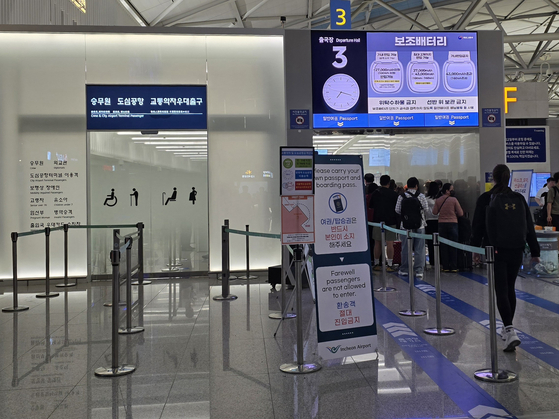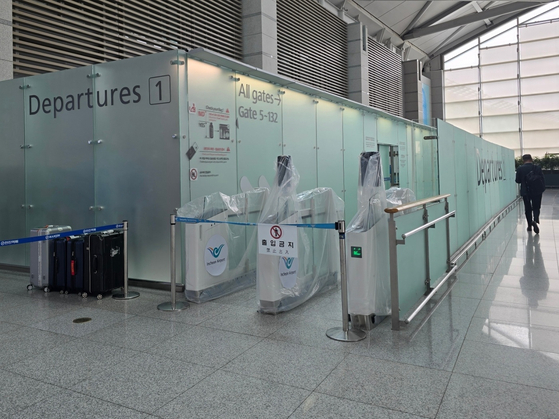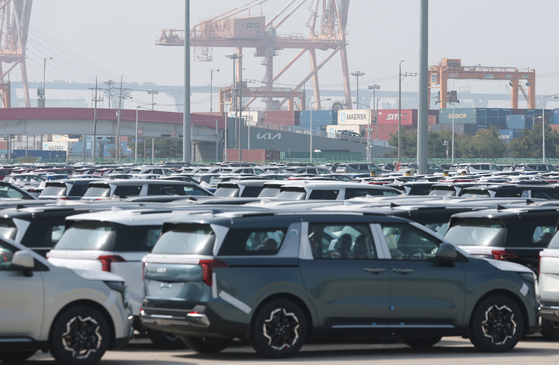Not So Fast: Debate Heats Up Over Speedy Airport Security as Workarounds Multiply

The general departure area at Incheon International Airport’s Terminal 1, pictured right, is packed with travelers, but the fast-track lane for passengers with disabilities and social contributors remains largely empty on May 15. [OH SAM-GWON]
On Thursday morning around 7 a.m., travelers queued up outside the departure gates of Terminal 1 at Incheon International Airport, awaiting their turn to pass through security checks.
Right next door, the express lanes intended for individuals with disabilities or those who have made significant public service contributions remained vacant. The two dedicated express exits at Gates 1 and 6 were entirely closed off, left idle without any personnel present.
The Korea Airports Corporation (KAC) has suggested extending use of the fast track system via a fee-based service.
However, the government has shown hesitance due to worries regarding public opinion. Additionally, the Ministry of Land, Infrastructure, and Transport recently implemented measures to essentially prohibit expedited immigration processes for non-governmental travel, leading to increasing grievances among travelers.
Opinions are divided.
“Corporate activities have become just as important as government work,” said 61-year-old Jeong Ok-jeong. “Even if it’s not for official duty, there should be a system that allows for swift immigration in necessary cases.”
But others see it differently.
Everybody queues up for security screenings to ensure flight safety,” explained 28-year-old Kim Jin-su. “If certain individuals can bypass the queue due to higher payments or urgent matters, it might make others feel unjustly treated.

At Incheon International Airport Terminal 1’s Gate 1, the express check-in lane reserved for individuals with disabilities and societal benefactors will be unavailable starting from May 15. [OH SAM-GWON]
In January, the Ministry of Land, Infrastructure, and Transport along with the Seoul Regional Office of Aviation instructed Incheon Airport to prohibit corporate travelers from utilizing expedited exit lanes unless they were on official government duty.
As a reply, Incheon Airport informed airlines about updated protocols. They implemented an additional clearance process mandating confirmation of public obligations prior to granting entry approval. Consequently, this change prohibited airlines from providing expedited services to first-class travelers and similar customers as part of their high-end benefits.
Amidst the crackdown, corporate travelers have progressively relied more on the APEC Business Travel Card (ABTC). This document provides quicker clearance through immigrations in 21 participating Asian-Pacific countries. Launched in 1997, the ABTC facilitates international commerce by easing travel restrictions for qualified employees of these companies.
Data acquired by the JoongAng Ilbo via a freedom of information request indicates that the issuance of ABTCs in South Korea surged over threefold from 9,422 in 2022 to 29,760 in 2023. This figure is anticipated to rise significantly in the current year as well.
In order to be eligible for the ABTC, candidates need to back firms that export at least $100,000 annually and satisfy personal criteria, including visiting nations part of APEC a minimum of four occasions over a span of two years. The allocation of these cards per organization hinges upon their total staffing levels.

Cars destined for export are stored at Pyeongtaek Port in Gyeonggi on April 24. [NEWS1]
Top industry figures are advocating for increased flexibility in immigration policies to bolster international commerce.
“During my last trip to Southeast Asia, the ABTC saved me 30 minutes to an hour at immigration each way,” said an executive overseeing legal affairs at a major Korean trade firm. “That gave me more time on the ground to advance business discussions.”
Still, the ABTC has its limits. It doesn’t apply to Europe, the Middle East or Latin America — regions critical to Korea’s export-driven economy — leading to growing complaints from companies affected by delays amid an increasingly volatile global trade environment.
The Incheon International Airport Corporation contends that implementing a paid express lane service is crucial for sustaining its competitive advantage. Of the global ranking of busiest airports based on passenger count, Incheon stands out as the sole airport within the top 30 that lacks this facility.
Accelerating development is crucial for Incheon Airport to maintain its position as the globe’s premier airport,” stated Incheon Airport CEO Lee Hak-jae during an interview with the JoongAng Ilbo in March. “This is a service we have to strive for in the interests of our nation.
Nevertheless, the government continues to be wary.
“Airports constitute a type of public infrastructure; thus, varying levels of treatment for different travelers ought to be thought through thoroughly,” stated Kim Young-hye, who leads aviation policy at the Transport Ministry. “Our objective is to alleviate crowding and guarantee that every passenger can access airport amenities swiftly and easily.”
Specialists argue that collective agreement from the public needs to be established first.
From both an industrial and consumer perspective, Fast Track is essential,” stated Professor Emeritus Yoon Moon-gil from Korea Aerospace University. “However, since Incheon Airport already processes travelers more quickly compared to numerous international airports, regular passengers might not perceive the necessity for such a service. It falls upon the government and airport officials to improve their communication regarding why this service holds significant value.
Translated from the JoongAng Ilbo using generative AI and edited by Korea JoongAng Daily staff.
BY OH SAM-GWON [kim.juyeon2@joongang.co.kr]